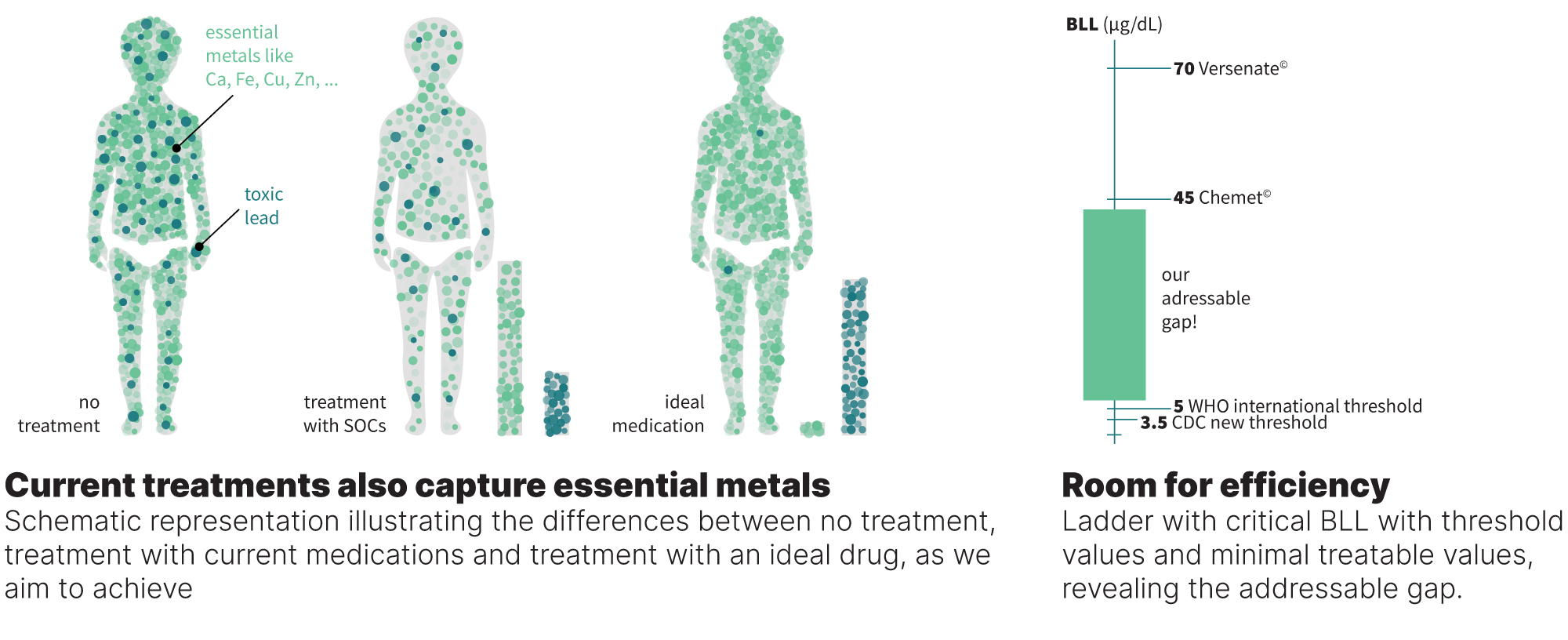
a revolutionary approach to capture toxic metals detoxify the body heal people
Hi there! Welcome to metaLead
A fitting molecular solution
metaLead is revolutionizing the treatment landscape for metal-related diseases. Preclinically, metaLead’s candidates have overcome significant limitations of the standards of care (SOCs), most critically in selectivity and depletion of specific metals, while leaving other metals intact. This gives us:
- Increased efficacy. metaLead’s candidates are tailored to capture specific metal ions and have better results in expelling specific metals from the blood and organs of mice, even when administered orally and at lower doses when compared head-to-head with the SOCs.
- Unparalleled selectivity, limiting off-target effects. High selectivity overcomes the crucial side effects of the SOCs, which also eliminate essential metals, eventually leading to substantial treatment limitations.
- Stable and orally available, as metaLead’s candidates are heavily modified. This ensures a compatible and patient-friendly administration route.
A multifaceted treatment approach
There is a wide range of metal-related conditions, with two types of toxic metals that can accumulate or be misregulated and hence negatively affect human health:
- Non-essential extrinsically toxic metals, such as lead and mercury, which should not be in the human body.
- Essential but misregulated metals, such as copper accumulation in the case of Wilson disease or copper deficiency in Menkes Disease.
Wilson disease is a lifelong rare disorder
Wilson disease is a rare genetic disorder, where mutations in the ATP7B protein cause the toxic accumulation of copper, mainly in the liver and brain. Patients require immediate lifelong treatment, where treatment delays may cause irreversible damage. If untreated, Wilson disease can be fatal, with a median life expectancy of 40 years.
Wilson disease is a rare genetic disorder, where mutations in the ATP7B protein cause the toxic accumulation of copper, mainly in the liver and brain. Patients require immediate lifelong treatment, where treatment delays may cause irreversible damage. If untreated, Wilson disease can be fatal, with a median life expectancy of 40 years.
- 5-10% of patients require liver transplant
- 1 in 90 people are carriers of the Wilson disease gene.
- 71% are symptomatic
- 33% have a hepatic presentation
- 36% have a neurological presentation
- 45% have psychiatric presentation
- 5-10% of patients require liver transplant
- 1 in 90 people are carriers of the Wilson disease gene.
- >70% are symptomatic
- 50-60% have a hepatic presentation
- 40-45% have a neurological presentation
- 10-20% have psychiatric presentation
1 in 30'000
people globally have Wilson disease
47'000+
in China
24'000+
in Europe
11'000+
in the US
Lead poisoning is a big problem. Still.
Lead is a non-essential neurotoxic metal widely abundant in our environment. Humans are exposed to lead through various industrial uses, affecting vast populations worldwide.
- Top ten chemicals of primary public health concern
- No blood lead level (BLL) is deemed safe
- Lead at even very low concentrations shows destructive effects on various body organs.
- Most countries adopt the WHO recommendation of 5 µg/dL as threshold values from which environmental and medicinal interventions should occur. In the USA, the CDC reduced this value to 3.5 µg/dL, recognizing again the devastating effects of lead at any level.
The available treatments for lead poisoning are strongly limited in their applicability and are inefficient in reaching sensible threshold values. 91.5% of diagnosed patients cannot be treated medically.
1 in 3
children globally live with lead toxicity (815M)
1 in 6
of young US children live with lead toxicity (2.1M)
5'000'000
children in Europe
400'000'000
children in Asia
